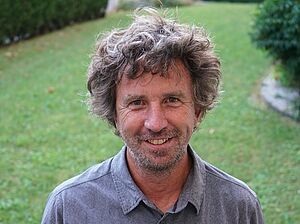"Organic must be accessible to everyone"
50th anniversary voices
Raphaël Charles has led FiBL's Department Suisse Romande since 2016. The agricultural and crop scientist had previously worked for 22 years in the Field-Crop Systems group at Agroscope Changins in the canton of Vaud.
How did you come to organic farming?
Raphaël Charles: After studying agricultural sciences at ETH Zurich, I joined Agroscope Changins in 1994. There I worked in the field of cultivation systems and was able to work closely with FiBL to some extent. Thanks to the "systems approach" and my critical attitude as a scientist, I gradually became aware of certain global challenges and began to understand that organic farming opened up promising prospects.
Why did it take until 2016 for a research movement around organic farming to officially emerge in French-speaking Switzerland?
Institutions in the organic sector emerged late compared to the agronomic organic movement, which already has many decades of practice. In fact, some of the Swiss organic pioneers came from the French-speaking part of Switzerland. In commercial terms, however, our region lagged behind for a long time.
For the development of organic research and organic advisory services in French-speaking Switzerland, the essential work of Maurice Clerc and Jean-Luc Tschabold of FiBL, Gerhard Hasinger and Josy Taramarcaz of Agridea, as well as Pascal Olivier of Bio Suisse and its member organisations needs to be highlighted. Dominique Barjolle, FiBL's vice-director at the time, was able to rely on all that work when founding the FiBL branch in French-speaking Switzerland. It was opened in 2016.
What were the general conditions for organic farming in French-speaking Switzerland like at the time?
There were positive reactions and support, both from practitioners and from public institutions. The Federal Office for Agriculture and the Directorate-General for Agriculture, Viticulture and Veterinary Affairs of the canton of Vaud immediately gave us assignments. This enabled us to increase our personnel. In addition, we were able to count on our French-speaking colleagues in Frick. The reception by Agridea, which rents us office space, was very constructive. We showed our willingness to work with all the actors in the sector and were thus able to integrate ourselves quickly and efficiently into the local agricultural fabric.
What development strategy have you pursued since 2016?
There is a start-up mentality in our branch, which has now become a department. The demands on all employees are high, whereby we consider competence and independence to be as important as human and social qualities. Every year, we have been able to recruit two highly committed people to our team. By hiring new staff in recent years, we are now active in all areas, from the farm to the table, in applied research as well as in advisory services.
What gives you particular satisfaction as leader of the department today?
Working every day with a competent, well-coordinated and committed team where people feel comfortable and flourish in their field of activity. I am extremely grateful for this privilege on a human level. I am also proud that I have been able to implement projects hand in hand with farmers, institutions and professional organisations. One example is Progrès Sol, a project that was completed in 2022 after a five-year collaboration with Proconseil, the Prométerre advisory service, and conventional and organic farmers in the canton of Vaud.
What challenges do you think organic farming faces in Switzerland?
Firstly, organic must be made accessible to all, and by that, I mean both farming and consumption. At the moment, organic is still too much of a niche. It's a matter of rethinking the whole sector in order to expand it. A second major challenge, in my opinion, is to make the many services that organic farming provides visible – for example, the promotion of biodiversity or its social contribution. So far, the public often equates organic with pesticide-free agriculture. It is time to replace this simplification with a message of multifunctionality. Thirdly, it is necessary to address the challenges at the level of nutrition and not just agriculture. I find that the focus is too often on farmers, even though the issues equally affect consumption. And finally, research must involve farmers even more intensively than before. Their education is ever increasing and it is important to involve them more not only as service providers, but especially because of their knowledge. In terms of involving actors along the food chain, we are only at the beginning.
Interview: Claire Berbain and Emma Homère
This is a shortened and slightly adapted version of an interview that appeared in issue 5/23 of the Bioaktuell magazine. It is available as a PDF.
Further information
Link
- orgprints.org: Interview in the Bioaktuell magazine (in German)
- orgprints.org: Interview in the Bioaktuell magazine (in French)
- orgprints.org: Interview in the Bioaktuell magazine (in Italian)




